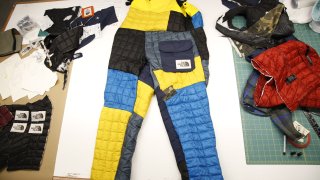
The global outdoor apparel market is a $12 billion industry. For more than a half century The North Face has competed in the space, outfitting mountain climbers and skiers. But the outdoor recreation brand is now hoping to become a big player in the $185 billion streetwear market as well.
A renewed interest in the outdoors has also benefited the company.
"There is certainly a return to outdoors, there is a focus on health and wellness, there is a commitment to sustainability and consumers are looking to connect with brands that speak to those particular trends," said Steve Rendle, CEO of VF Corp., parent company of The North Face.
That has given the company's bottom line a boost. In October VF Corp. reported that fiscal second-quarter revenue at The North Face increased 31% to $883 million.
Get Connecticut local news, weather forecasts and entertainment stories to your inbox. Sign up for NBC Connecticut newsletters.
And while interest in outdoor activities has surged, climate change and consumer trends such as sustainability have led to a range of challenges and opportunities for the brand. Every year 85% of textiles produced — including clothing, shoes and gear — ends up in landfills.
So how is The North Face pivoting in its battle with rivals such as Patagonia in the crowded outdoor apparel space? And what led to the company's transition from climbing gear to streetwear?
See the video above to learn more about The North Face's new direction.
Money Report
Watch more:
Leaving a tip is an American custom. Why that's a problem
Why Americans are eating more snacks






